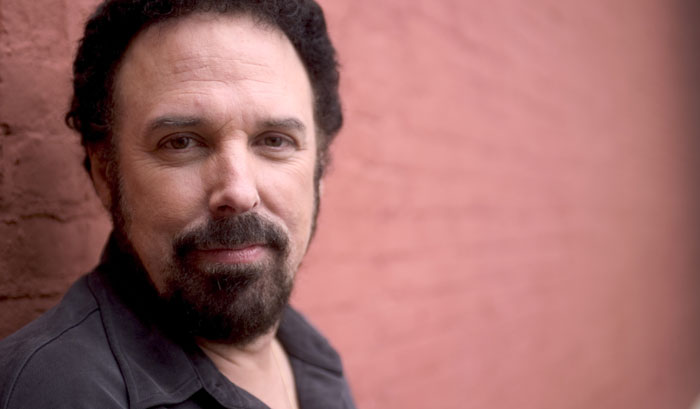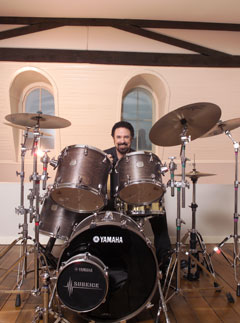


Nashville-based drummer Eddie Bayers is at the top of his profession, winning dozens of industry awards and playing with such greats as Vince Gill, George Strait, Steve Winwood, Peter Frampton, Bob Seger, Trisha Yearwood, and Garth Brooks. But he didn't always sit behind the skins; in fact, he began his musical career as a professional pianist with a classical and rock background.
"A lot of my colleagues play multiple instruments," Bayers notes. "But I think my situation is unusual, in that I was trained classically in piano before moving into mainstream commercial music."
I've been wearing out my Yamaha Roy Haynes snare, because it's so diverse. I can tune it high or mid or low, and it speaks on every level.
The big switch came when Bayers relocated from Oakland, California, to Nashville and auditioned on piano for a quartet featuring legendary session drummer Larry Londin. He recalls, "I'd been messing around on drums for years, but I'd never owned my own kit or anything. But Larry inspired me so much, I started playing drums."

It was just a matter of time before word got out about Eddie's unique touch. "Five nights a week, I'd play Top 40 music on drums in the club," he recounts. "I'd pursue studio work by day. Eventually my name got out there, and I started getting asked to play on specific efforts, like Dolly Parton records or some of the Urban Cowboy music."
Eddie is equally comfortable playing pop and country. Besides, he says, "I'd like anyone to tell me the difference between country and pop records these days. The bed of the music in pop and most country today is pretty similar. Take Shania Twain: those records are produced by Mutt Lange, who also produced bands like Journey. Playing on a Bob Seger record is no different for me than playing on a Kenny Chesney record-the same energy is required, and it doesn't take anything more or less to play the music. To me, those categories are there for corporate reasons, not musical ones."
As a result, Eddie's gear varies only slightly from session to session. He uses a hybrid Yamaha Absolute kit with 10", 12", 14" and 16" birch toms, but opts for a maple 22" kick. He often enhances his sound with programmed percussion. "These days," he notes, "90% of records are played to a click. I find that those sequenced parts round out the feel between takes. I'll get pretty much the same feel on every take, but each one will have different fills, so there's still some spontaneity there."
Snare-wise, Bayers says he's used just about everything Yamaha makes. "The choice depends on what we're looking for. A lot of times, we just put things up and see how they work. I've used an Akira Jimbo snare a lot, even before I signed with Yamaha. And I've been wearing out my Roy Haynes snare, because it's so diverse. I can tune it high or mid or low, and it speaks on every level, as opposed to snares whose 'meat' lies in one specific tuning."
Bayers says he re-tunes for every track. "Because I always play an open snare, I try to find a pitch that correlates to the key of the song. You can't always tune to the tonic, but I often go to the fourth, fifth, or even sixth of the key. I like some ring in my snare, as long as it's something relative to the key. Maybe one in six engineers don't like any snare ring, but the engineers I respect most like the drums to ring as long as the day. Those guys rely on the ambient ring of the drums to control their echoes and reverbs."
Given all the great projects he's contributed to, it hardly seems fair to ask Bayers which sessions are most memorable. But, he says, "There are some I'd point to because I was able to work with some incredible people. Like Tammy Wynette-I was very close to her. On her duet album Sting came in, and I was able to play "Every Breath You Take" with Sting playing the bass part! Other meaningful ones are records that have longevity, like George Strait's new album, or artists who struggle and struggle before breaking through, like Vince Gill. It's very special when you're with an artist on the front-end, from the demo through the record. I had that experience with Alan Jackson, Trisha Yearwood, and Randy Travis. Those things are certainly meaningful."
























